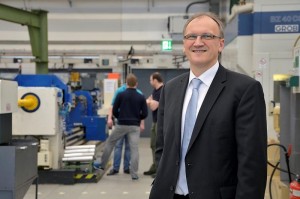For many people, grinding is more of a conventional production technique, suitable only for the final polish, but otherwise with nothing new to offer. An opinion that will be refuted by the Institute of Machining Technology (ISF) at Dortmund University of Applied Science during its Grinding Seminar during the METAV 2014. In Düsseldorf on 13 and 14 March 2014, the topics addressed will include finely ground functional surfaces, micro-structured compressor blades and finished large-diameter anti-friction bearings. “Dry machining of carbon-fibre-reinforced plastics using hollow grinding pencils”, “Super-micro band-finishing without cooling lubricants” or “Magnet finishing for preparation of solid carbide tools” – just a brief glance at three recent publications from the head of the Grinding Technology Department at the ISF in Dortmund, Tobias Heymann, shows that there’s plenty going on in the world of grinding. “Improved performance and better process design for the grinding machines and their tools have meant that this process is being used not only for finishing, but is meanwhile replacing other technologies as well”, explains Heymann. “When difficult-to-machine materials are involved, for example, it replaces milling or hard-turning.”
Sights on customised functional surfaces
Grinding’s actual core competence, in Heymann’s view, is and remains fine and ultra-fine machining, in which customised functional surfaces are created. The grinding expert sees this task as a keynote topical issue, which is needed in the automotive industry, for instance, with a view to reducing consumption levels. Typical applications here include engines, which thanks to modified running surfaces operate with less friction, thus downsizing fuel consumption. Recently, moreover, grinding has been used in fields (e.g. creep-feed grinding) where higher ablation rates are required.
The ISF has also taken this development on board with the topics chosen for its Grinding Seminar, which is divided into three keynote sections. Under the heading of “The machine and its surroundings”, expert speakers examine various relevant aspects, such as combination machining or finishing large-diameter anti-friction bearings. “Because the user also has to monitor surfaces created in a sophisticated process, he needs sturdy metrological systems for direct use in the production process”, explains Heymann. Another topic, in the context of energy-efficiency, is the supply of cooling lubricant: here, ester-based lubricants appear to be gaining ground as an organic alternative to the cooling lubricants based on mineral oil, because the former can be disposed of more easily (and more affordably too).

together with Department Head Tobias
Heymann, reports at the METAV 2014 on new
grinding technologies.
The carbon-fibre-reinforced-plastic grinding disk is on the advance
In the “Tools” keynote section, the focus is on the details. Experts will be reporting there, for example, on new bond compositions and grain specifications for grinding disks. Heymann comments: “The seminar addresses the question of what can be achieved with optimum matching of the grinding disk to the process involved.” Due to the more stringent requirements for grinding, moreover, there are more disks available now with base bodies made of carbon-fibre-reinforced plastic, which permit higher circumferential grinding speeds of up to 250 metres per second and more. The expert from Dortmund has observed that it’s no longer just one manufacturer now, but meanwhile around a handful of companies that are offering grinding disks made of carbon-fibre-reinforced plastic. The third keynote topic, “Process”, deals with ultra-fine machining. Speakers will be presenting new processes and developments that ensure mastery of finishing above and beyond grinding as such.
The 5th Dortmund Grinding Seminar once again provides a platform for expert mutual feedback between the industrial sector and the research community: the speakers are confidently expected to offer plenty of food for thought, as the ISF has been able to bring on board eminent representative of the industrial sector and the academic community. The bandwidth of topics ranges from cooling lubricant feed in the context of energy-efficiency and process dependability (Blazer Swisslube GmbH, Stuttgart), plus sintering of micro-structured compressor blades (Prof. Berend Denkena, Institute for Production Technology and Machine Tools, Hanover University), cost-efficient grinding process development for automotive piston rings (Federal Mogul Burscheid GmbH, Burscheid) all the way through to super-finishing with piezo support (Supfina Grieshaber GmbH & Co. KG, Wolfach).
METAV 2014: synergised source of information for researchers
Like the ISF’s Director, Professor Dirk Biermann, the department head and organiser Heymann will also be giving a specialist presentation on new grinding technologies during the METAV 2014; both of them, though, appreciate the event as more than a just tried-and-tested venue for the ISF’s grinding seminar. As Heymann emphasises: “The trade fair in Düsseldorf provides an excellent opportunity to acquire large amounts of information in one place from the numerous manufacturers of grinding machines and tools, and not least, too, there’s the geographical proximity to the ISF.”
For your diary
What: 5th Dortmund Grinding Seminar METAV Special 2014
When: Thursday, 13 March 2014, 12.30 to approx. 5.00 p.m., followed by an evening event
Friday, 14 March 2014, 9.00 a.m. to approx. 2.30 p.m., subsequent option for a guided tour of the fair
Where: Düsseldorf Trade Fair Grounds, Congress Center, CCD East
Room L
Registration: www.isf.de/schleifseminar2014



